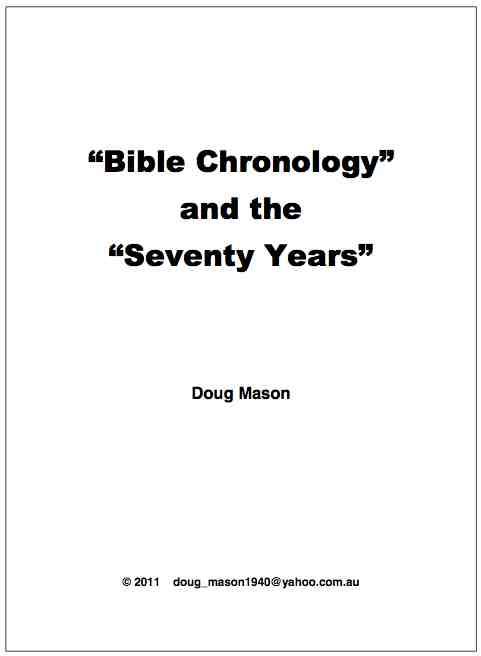home > questionable doctrine > 607 : 1914 : seven times > 70 years
607 : 1914 : Seven Times
When were the 70 years?
Watchtower claims Bible prophecy would be compromised if Jerusalem did not fall in 607 B.C. This is not the case, and other Christian Groups reconcile the 70 year period within the historically accurate timeframe of 587 B.C.
Further Articles Relating to
Seven Times, 607, 1914 & Last Days
Introduction to Seven Times Prophecy
607 B.C. or 587 B.C.
Inconsistent methodology
70 years - when were they?
History of the prophecy
Did the Last Days Start 1914?
As there is no reason to believe Daniel 4 has two fulfillments, the precise start and end of the seventy year period is not of particular importance to most people. However, for the sake of Watchtower followers, it is important to understand how the 70 years can be reconciled with 587 B.C., whilst remaining faithful to Bible statements.
Several Bible authors refer to a 70 year period, and close reading shows the possibility of more than one 70 year period. The 70 years can be seen within the concept of a Babylonian timeframe or a Jewish one. Furthermore, there is no reason that the 70 year period need be applied literally.
Babylonian timeframe

Click on the image for a 22 page PDF providing detailed explanation of when the 70 years started and ended.
The 70 years can be viewed from a Babylonian perspective, including their domination of the nations. Jeremiah 25 applies a 70 year period to both the surrounding nations and Jerusalem.
Jeremiah 25:11-12 "And all this land must become a devastated place, an object of astonishment, and these nations will have to serve the king of Babylon seventy years.'And it must occur that when seventy years have been fulfilled I shall call to account against the king of Babylon and against that nation,' is the utterance of Jehovah, 'their error, even against the land of the Chal·de´ans, and I will make it desolate wastes to time indefinite.'"
This shows the 70 years were the entire period the Babylonians were conquering "these nations", and the period of vassalage to the Babylonians. Jeremiah 25 ends the 70 years with the "account against the King of Babylon". The Babylonians dominated for a seventy year period from their defeat of Assyria in 609 B.C., to their fall in 539 B.C.
Jeremiah 29:10 concurs with this. In a number of translations, this verse links the completion of the 70 years with Babylon.
"This is what the LORD says: "When seventy years are completed for Babylon, I will come to you and fulfill my gracious promise to bring you back to this place." New International Version - see also ESV, NASB, RSV, ASV and DBY.
Jewish timeframe
The 70 years can be viewed within the concept of a Jewish timeframe. Zechariah 1:12, Zechariah 7:4-5, 2 Chronicles 36:20-23 and Daniel 9:2 all refer to 70 year periods.
Daniel 9:2 "In the first year of his reigning I myself, Daniel, discerned by the books the number of the years concerning which the word of Jehovah had occurred to Jeremiah the prophet, for fulfilling the devastations of Jerusalem, [namely,] seventy years."
Daniel may be indicating the period from the first destruction of Jerusalem in 601 B.C.
In the New World Translation, Jeremiah 29:10 refers to Israelites spending 70 years at Babylon. Reading from verse 1 indicates this includes the time period when the Israelites were taken to Babylon prior to the destruction of Jerusalem. Historians conclude this occurred in the year 605 B.C. when Daniel and his companions were taken.
Alternately, 70 years could refer to the time period between the destruction of the first temple in 586 B.C. and the completion of the second temple in 515 B.C. The temple was completed more than 20 years after the return from Babylon.
Whatever the case these, none of these periods point to 607 B.C. and yet Bible prophecy can continue to hold true, whilst accepting well supported secular history. Considering Daniel 4 is not an end time prophecy, there is no relevance to the precise start and end dates of the 70 years.
Figurative timeframe
Watchtower claims that the 70 year period of Tyre's desolation was figurative, but the 70 year period of Jerusalem's desolation had to be literal.
In its Hebrew connotation, the number 70 can be used to represent completeness or universality. It is not necessary for the 70 years of devastation to be a literal period of time. Consider the enlightening piece of Watchtower reasoning for why the 70 year desolation of Tyre was not literal.
"Isaiah goes on to prophesy: "It must occur in that day that Tyre must be forgotten seventy years, the same as the days of one king." (Isaiah 23:15a) He says: "These nations will have to serve the king of Babylon seventy years." (Jeremiah 25:8-17, 22, 27) True, the island-city of Tyre is not subject to Babylon for a full 70 years, since the Babylonian Empire falls in 539 B.C.E. Evidently, the 70 years represents the period of Babylonia's greatest domination-when the Babylonian royal dynasty boasts of having lifted its throne even above "the stars of God." Isaiah's Prophecy- Light For All Mankind 1 p. 253
There is no reason that this same reasoning could not be applied to Jerusalem. If the seventy years of Tyre was not a literal 70 years, then the 70 years for Jerusalem does not need to be taken literally. This inconsistency between Watchtower reasoning for Tyre and Jerusalem identify the bona fide reason the Watchtower rejects 587 B.C. is purely that it undermines their basis for 1914.
Ukrainian translation of this article.
Written 2007. Latest update November 2022.
![]() Paul Grundy 2005 - 2026
Paul Grundy 2005 - 2026

